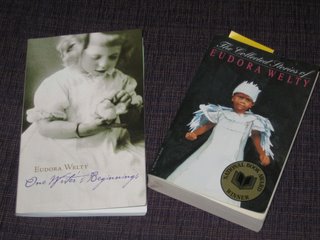
I am enjoying Eudora Welty a lot. She has a great gift for setting scenes and bringing her characters alive. Here's one thing I have noticed so far about her short stories: nearly every one of them begins with a character either speaking or doing something in a setting. In the very first sentence, she establishes the character and the place.
For example, the first sentence of "Lily Daw and the Three Ladies" is: "Mrs. Watts and Mrs Carson were both in the post office in Victory when the letter came from the Eilisville Institute for the Feeble-Minded of Mississippi."
And "A Still Moment" begins: "Lorenzo Dow rode the Old Natchez Trace at top speed upon a race horse, and the cry of the itinerant Man of God, 'I must have souls! And souls I must have!' rang in his own windy ears.
And my so-far favourite, "Why I Live at the P.O." starts like this: "I was getting along fine with Mama, Papa-Daddy and Uncle Rondo until my sister Stella-Rondo just separated from her husband and came back home again. Mr. Whitaker! Of course I went with Mr. Whitaker first, when he first appeared here in China Grove, taking 'Pose Yourself' photos, and Stella-Rondo broke us up."
"No Place for You, My Love," starts out: "They were strangers to each other, both fairly well strangers to the place, now seated side by side at luncheon--a party combined in a free-and-easy way when the friends he and she were with recognized each other across Galatoire's."
For fear of this post starting to seem like an annotation, I just have to say that when I noticed this particular fact about Eudora Welty's stories, I took note. There is no running start here. No confusing period in which you don't know where you are or who you're dealing with. Nonetheless, she hasn't given away the game, either. I have struggled in my own writing with setting the scenes and, more seriously, introducing my characters. Watch how Eudora jumps in with both feet in the opening of "Petrified Man":
"Reach in my purse and git me a cigarette without no powder in it if you kin, Mrs. Fletcher, honey, " said Leota to her ten o'clock shampoo-and-set customer. "I don't like no perfumed cigarettes."Right away you know that the speaker's name is Leota, she's a hairdresser, she's in her salon in the morning, wants a cigarette (which she keeps in her purse, alongside the powder), is good at asking for what she wants, and her customer's name is Mrs. Fletcher. It's also a good bet that they're in the South somewhere and Leota didn't go far in formal schooling.
Anyway, I love that ability to bring a story alive immediately. There is a lot of good craft "advice" in Eudora Welty's short stories. Today, I will read her as a teacher.




6 comments:
This is great! It's nice to see what your notes on an annotation look like. Good job!
I agree with Bug--great observations and insight. I think this is exactly what the annotations are supposed to do: get us thinking about HOW the writing works and WHY...and then relate it to our own. And you've done that here. Nice work!
I'm coming back later to comment- got to run....
I didn't even notice this about her stories. Great find. I would steal it if I hadn't already decided on my theme.
I like her writing too, but I didn't dive into it like I have some of my other assignments, perhaps a cultural difference? Her work strangely enough seems distant to me.
Thanks! Repeater, I'm also finding her writing to be less engaging (on the whole) than some, but I think that it's partly because I am rushing from one story to the next rather than letting myself take them in slow sips, and sitting with each for a bit before moving on. They are really varied in mood. What's your theme? I dn't know that mine is what I talked about here.
Yeah, I'm also rushing it, so that could be part of it. I believe I'm going to talk about getting the right perspective and distance, moving around within the piece. I think you should go with what you've got here. I wouldn't have picked up on it.
Post a Comment